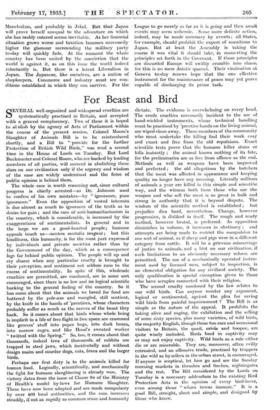For Beast and Bird
SEVERAL well-organized and widespread cruelties are systematically practised in Britain, and accepted with a general complacency. Two of these it is hoped to alolish by the agency of Acts of Parliament within the course of the present session. Colonel Moore's Slaughter of Animals Bill is to be reintroduced shortly, and a, Bill to "provide for the further Protection of British Wild Birds," was read a second time in the House of Lords on Tuesday. But Lord Buckmaster and Colonel Moore, who are backed by leading members of all parties, will succeed in abolishing these slurs on our civilization only if the urgency and wisdom of the case are widely understood and the force of public opinion is behind them.
The whole case is worth reasoning out, since cultural progress is chiefly arrested—as Dr. Johnson used to confess of his own mistakes—by "ignorance, pure ignorance." Even the opposition of vested interests is due almost as much to ignorance of the truth as to desire for gain ; and the sum of anti-humanitarianism in the country, which is considerable, is increased by the exaggerations of sentimentalists. In general and in the large we are a good-hearted people; humane appeals touch us—mentem mortalia languid; but this kindliness, this humanity, is for the most part expressed by individuals and private societies rather than by the Government of the day, which as a consequence lags far behind public opinion. The people will up and cry shame when any particular cruelty is brought to their perception, and sentiment not seldom runs to the excess of sentimentality. In spite of this, wholesale cruelties are permitted, are condoned, are in some sort encouraged, since there is no law and no logical scientific backing to the general feeling of the country. So it has come about that the animals we breed for food are battered by the pole-axe and mangled, still sentient, by the knife in the hands of 'prentices, whose characters probably suffer as much as the nerves of the beast they hack. So it comes about that birds whose whole being is implicit in a life of free flight in free space are crammed like grocers' stuff into paper bags, into dark boxes, into narrow cages, and like Hood's sweated worker "twitted with the Spring." So, too, it comes about that thousands, indeed tens of thousands, of rabbits are trapped in steel jaws, which incidentally and without design maim and murder dogs, cuts, foxes and the larger birds.
Perhaps or first duty is to the animals killed for human food. Logically, scientifically, and mechanically the fight for humane slaughtering is already won. The victory dates from the issue of Clause On of the Ministry of Health's model by-laws for Humane Slaughter. These have now been adopted and are made compulsory by over 460 local authorities, and the sum increases steadily, if not as rapidly as common sense and humanity
dictate. The evidence is overwhelming on every head. The crude cruelties necessarily incident to the use of hand-wielded instruments, whose technical handling must be practised by 'prentice hands on the living animal, are wiped clean away. Those members of the community who must undertake the killing find their work easy and exact and free from the old repulsions. Exact scientific tests prove that the humane killer stuns or kills instantly ; the animal knows nothing of its fate, for the preliminaries are as free from offence as the end. Methods as well as weapons have been improved and perfected ; the old allegations by the butchers that the meat was affected in appearance and keeping quality no longer have any meaning. Literally millions of animals a year are killed in this simple and scientific way, and the witness both from those who use the weapon and who sell the meat is so great in bulk and strong in authority that it is beyond dispute. The wisdom of the scientific method is established ; but prejudice dies hard, nevertheless. Change, however progressive, is disliked in itself. The rough and ready method, however brutal, is preferred. As opposition diminishes in volume, it increases in obstinacy ; and attempts are being made to restrict the compulsion to one sort of animal, as if sheep and pigs were in a different category from cattle. It will be a grievous miscarriage of justice to animals, and a blot on our civilization, if such limitations to an obviously necessary reform are permitted. The use of a mechanically operated instru- ment used by licensed men, subject to inspection, is an elemental obligation for any civilized society. The only qualification is special exemption given to those who have scruples connected with their religion.
The second cruelty condoned by the law relates to our wild birds. Can anyone muster any argument, logical or sentimental, against the plea for saving wild birds from painful imprisonment ? The Bill is as simple as the nature of the appeal. It prohibits the taking alive and caging, the exhibition and the selling of some sixty species, plus many varieties, of wild birds, the majority English, though those too rare and occasional visitors to Britain, the quail, oriole and hoopoe, are quite wisely included. Birds bred in captivity may or may not enjoy captivity. Wild birds as a rule either die or are miserable. They are, moreover, often evilly entreated, and an offensive trade, practised by trappers in the wild as by sellers in the urban street, is encouraged. If anyone is sceptical, let him go and see the Sunday morning markets in thrushes and finches, nightingales and the rest. The Bill considered by the Lords on Tuesday is a necessary addendum to the existing Bird Protection Acts in the opinion of every bird-lover, even among those "whom towns immure." It is a good Bill, straight, short and simple, and designed by those who know.






































 Previous page
Previous page